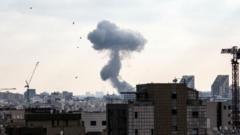As tensions rise dramatically between the United States and Iran, the delicate balance that had kept a direct military confrontation at bay for decades has now been irreversibly altered following US military strikes on Iran's nuclear facilities. For years, US presidents have been cautious, wary of a conflict that would sink America into another Middle Eastern quagmire. However, the current president, who campaigned on the promise of peace, has escalated the situation with unprecedented attacks, leaving world leaders uneasy about what comes next.
US-Iran Relations on Edge Following Military Strikes: A Dangerous New Chapter

US-Iran Relations on Edge Following Military Strikes: A Dangerous New Chapter
The recent escalation between the US and Iran marks a potentially pivotal moment in their fraught history, prompting concerns over future actions that could escalate tensions further.
Iran's Supreme Leader, Ayatollah Ali Khamenei, now reportedly in hiding, faces significant challenges in crafting an appropriate response. Under immense pressure, he must balance national pride and criticism from within while avoiding a miscalculation that could ignite a full-scale war. Experts contend that Khamenei's decisions in this high-stakes environment could define his legacy and the future of the Islamic Republic.
Recent Israeli airstrikes have already crippled Iran's military capabilities, resulting in high-profile casualties among key military and nuclear personnel. In response, the Islamic Revolutionary Guard Corps (IRGC) has issued stern threats of retaliation against US forces, yet analysts caution that Iran is not eager for war. There exists a complex debate over how Tehran should respond, as anything less than a strong reply risks national dignity, while aggressive actions could provoke severe retribution from the US.
The future trajectory of this confrontation hinges heavily on the actions of both nations. The US strike is viewed as the most significant military operation in years, aimed at debilitating Iran’s nuclear ambitions. Intelligence reports claim the damage to Iran's infrastructure was extensive, yet Tehran deems the US diplomatic overtures, now viewed as demands, as untenable. Iran's leadership firmly rejects the call to cease uranium enrichment, regarding it as a breach of their rights under international law.
European powers, along with various international bodies, are expressing deep concern over the escalation, calling for dialogue over warfare, emphasizing the dangers of a nuclear-armed Iran. However, with each passing day, the prospect of a diplomatic resolution appears increasingly remote, leaving both nations on a precarious precipice, where the next move could either escalate tensions or tip towards a fragile peace.
As the situation unfolds, analysts are left pondering whether recent US actions will ultimately serve to reduce or exacerbate the threat of nuclear proliferation in Iran. The stakes are incredibly high, and the world watches closely as history hangs in the balance.
In this delicate theater of global politics, observers note that the potential for a nuclear Iran now looms larger than ever, presenting a dire challenge for not only the US and Iran but for international stability as a whole.
Recent Israeli airstrikes have already crippled Iran's military capabilities, resulting in high-profile casualties among key military and nuclear personnel. In response, the Islamic Revolutionary Guard Corps (IRGC) has issued stern threats of retaliation against US forces, yet analysts caution that Iran is not eager for war. There exists a complex debate over how Tehran should respond, as anything less than a strong reply risks national dignity, while aggressive actions could provoke severe retribution from the US.
The future trajectory of this confrontation hinges heavily on the actions of both nations. The US strike is viewed as the most significant military operation in years, aimed at debilitating Iran’s nuclear ambitions. Intelligence reports claim the damage to Iran's infrastructure was extensive, yet Tehran deems the US diplomatic overtures, now viewed as demands, as untenable. Iran's leadership firmly rejects the call to cease uranium enrichment, regarding it as a breach of their rights under international law.
European powers, along with various international bodies, are expressing deep concern over the escalation, calling for dialogue over warfare, emphasizing the dangers of a nuclear-armed Iran. However, with each passing day, the prospect of a diplomatic resolution appears increasingly remote, leaving both nations on a precarious precipice, where the next move could either escalate tensions or tip towards a fragile peace.
As the situation unfolds, analysts are left pondering whether recent US actions will ultimately serve to reduce or exacerbate the threat of nuclear proliferation in Iran. The stakes are incredibly high, and the world watches closely as history hangs in the balance.
In this delicate theater of global politics, observers note that the potential for a nuclear Iran now looms larger than ever, presenting a dire challenge for not only the US and Iran but for international stability as a whole.






















